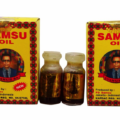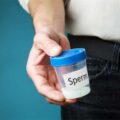
Ejaculating refers to the process by which semen is expelled from the penis during sexual activity. Ejaculation typically occurs during orgasm, which is the intense physical and emotional release that occurs at the peak of sexual arousal. Ejaculation can occur during any form of sexual activity that involves penile stimulation, including masturbation, oral sex, vaginal sex, and anal sex.
The exact process of ejaculation involves a series of muscle contractions in the pelvic region that force semen out of the body. These contractions are controlled by the sympathetic nervous system and can be influenced by a variety of factors, including physical stimulation, psychological arousal, and certain medications or medical conditions.
It is worth noting that while ejaculation is a normal and healthy part of sexual activity for most men, there are certain conditions that can impact the ability to ejaculate, such as erectile dysfunction, premature ejaculation, or retrograde ejaculation (when semen is expelled into the bladder rather than out of the body).
How often do men ejaculate?
The frequency of ejaculation can vary widely among men and is influenced by a variety of factors, including age, overall health, sexual activity, and individual physiology. Here are some additional details about how often men typically ejaculate:
- Age: Younger men tend to ejaculate more frequently than older men, as they typically have higher sex drives and more frequent sexual activity. As men age, their testosterone levels decrease, which can lead to a decrease in sexual desire and a lower frequency of ejaculation.
- Sexual activity: Men who are in sexually active relationships or who engage in frequent sexual activity, either alone or with a partner, are more likely to ejaculate more often. Conversely, men who have less frequent sexual activity or who are abstinent may ejaculate less frequently.
- Individual physiology: The frequency of ejaculation can vary widely based on an individual’s physiology and sexual preferences. Some men may have a higher sex drive or a greater need for sexual release than others, leading to more frequent ejaculation. Additionally, some men may find that they are able to delay ejaculation for longer periods of time, leading to less frequent ejaculation.
- Health conditions and medications: Certain health conditions, such as prostate problems or low testosterone levels, can lead to a decrease in the frequency of ejaculation. Additionally, certain medications, such as antidepressants or blood pressure medications, can interfere with sexual function and lead to a decrease in the frequency of ejaculation.
Overall, there is no set “normal” frequency of ejaculation, as sexual behavior and preferences can vary widely among individuals. As long as ejaculation is not causing any discomfort or interfering with daily life, the frequency of ejaculation is generally considered a personal choice.
At What Age Does A Man Stop Ejaculating?
There is no specific age at which a man stops ejaculating, in fact having sex at an older age can make you happier and healthier. However, it is important to note that as men age, there can be changes in sexual function that may impact the frequency, intensity, and experience of ejaculation.
One of the key factors that can impact ejaculation as men age is changes in testosterone levels. Testosterone is a hormone that plays a critical role in sexual development and function, including the production of semen and the ability to ejaculate. As men age, testosterone levels typically decrease, which can lead to a decrease in sexual desire and a lower frequency of ejaculation.
Additionally, age-related health conditions can impact sexual function and may make it more difficult to ejaculate. For example, prostate problems, such as benign prostatic hyperplasia (BPH) or prostate cancer, can impact the volume and quality of semen, and may make it more difficult to ejaculate. Other health conditions, such as cardiovascular disease or diabetes, can also impact sexual function and may lead to changes in ejaculation.
It’s worth noting, however, that changes in ejaculation as men age are not inevitable. There are many different factors that can impact sexual function and health, and many of these factors are within our control. For example, maintaining a healthy diet and exercise routine, managing stress, and avoiding smoking and excessive alcohol consumption can all help to support sexual health and function throughout life.
If you are experiencing changes in your ability to ejaculate or are concerned about your sexual health, it’s important to speak with a healthcare provider who can provide guidance and treatment options. There are many different treatments and strategies that can help to support sexual health and function, including medications, lifestyle changes, and counseling.
Are There Supplement That Enhance Ejaculation?
There are various supplements that are marketed as being able to enhance ejaculation, but it is important to approach these claims with caution. Many of these supplements lack scientific evidence to support their effectiveness and safety, and some may even be harmful.
One supplement that has been studied for its potential effects on ejaculation is zinc. Zinc is an essential mineral that plays a key role in the production of semen, and some studies have suggested that zinc supplementation may help to increase semen volume and improve sperm motility. However, more research is needed to fully understand the potential benefits and risks of zinc supplementation for improving ejaculation.
Other supplements that are sometimes marketed as being able to enhance ejaculation include L-arginine, maca root, and ginseng. While these supplements may have other health benefits, such as improving erectile function or reducing stress, there is limited scientific evidence to support their effectiveness for enhancing ejaculation specifically.
It is also worth noting that some supplements, particularly those marketed as “herbal Viagra” or “natural male enhancement” products, may contain hidden or undisclosed ingredients that can be harmful. These ingredients can interact with other medications or health conditions and can cause serious side effects such as low blood pressure, heart attack, or stroke.
If you are interested in trying a supplement to enhance ejaculation or improve sexual function, it is important to speak with a healthcare provider first. They can provide guidance on which supplements may be safe and effective and can help you weigh the potential benefits and risks. They can also help you to identify any underlying health conditions or medications that may be impacting your sexual function and can recommend appropriate treatments or strategies to address these issues.





